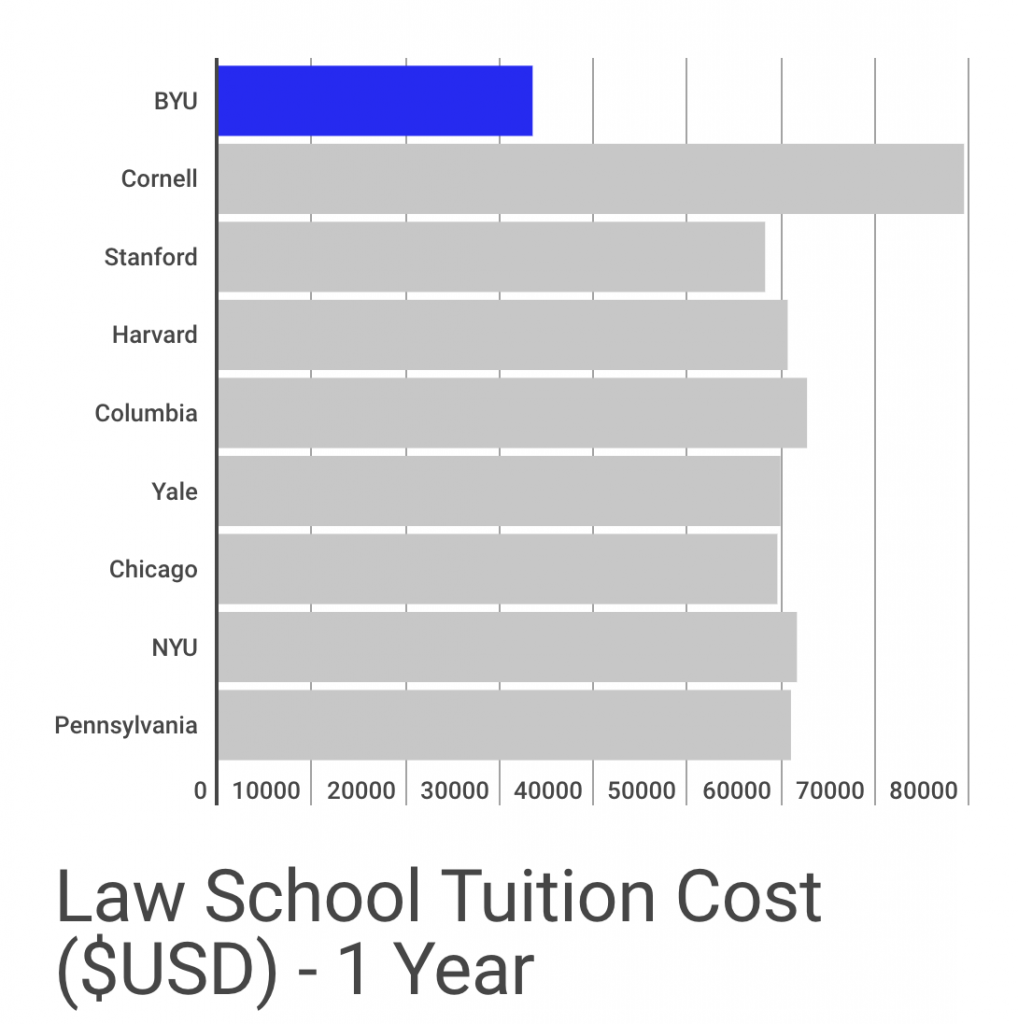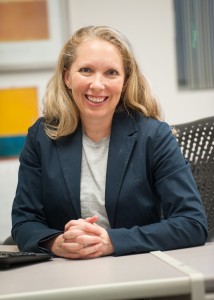
The J. Reuben Clark Law School has earned its place in the top 50 law schools in the United States. BYU law graduates experience the highest return on investment in America and less debt post graduation, according to a study by Social Finance Inc.
 A recent study that judges law schools based on where the most qualified students attend ranked BYU law 20th in the nation, a 26-point increase from the U.S News rankings.
A recent study that judges law schools based on where the most qualified students attend ranked BYU law 20th in the nation, a 26-point increase from the U.S News rankings.
These achievements, along with BYU Law’s emphasis on ethics and dedication to legal scholarship, have turned it into an ideal school for many prelaw undergraduates; however, the school maintains an acceptance rate of only 41 percent.
BYU’s Pre Professional Advisement Center provides myriad resources for prelaw students. These resources can help students navigate the information available to them and feel confident despite discouraging statistics.

“When a student is a freshman, I see them as moldable clay and an opportunity to create the perfect applicant,” said Kris Tina Carlston, Pre Professional Advisement Center director. “When they’re a senior, we have to work with what they’ve got.”
Truman Whitney, a BYU senior studying finance who plans to start law school Fall 2018, recommends students take advantage of the resources available to prelaw students early in their undergraduate degree.
“Kris Tina Carlston is remarkably focused on helping students prepare for and navigate the admissions process,” Whitney said. “I would recommend visiting as early as possible, even if a student is unsure about their potential interest in law.”
The first thing future law students should consider is their undergraduate degree. The American Bar Association recommends prelaw students major in history, English, political science, economics, business or philosophy.
If a student majors in something they enjoy, the likelihood of them excelling academically improves exponentially, according to Carlston. If a student majors in something they are passionate about, Carlston encourages them to major in it with an “exclamation point.”
“That means I want you to take advantage of the opportunities, research and professors that are available in that major and make it your own,” Carlston said. “Each major has their own subset opportunities, but you have to find them.”
She also recommends students don’t shy away from writing classes. Carlston believes students should feel confident as writers when they enter law school, and even a basic understanding of structure and passive voice is helpful.
Although there is not an official prelaw undergraduate degree, students can take prelaw classes. In addition to providing useful skills for law school, Carlston believes these classes provide a valuable opportunity for students to stay connected.
“You are sitting and meeting people who are likeminded and looking at pursuing the same things as you,” Carlston said. “You can meet people who are a little bit further in their undergraduate and ask, ‘What have you done? How did you get that experience?'”
For a list of some helpful BYU classes for pre-law students of any major, click here.
Preparing for the LSAT
Regardless of GPA, the LSAT can make or break a law school application. According to the Law School Admissions Council, the LSAT is designed to measure skills considered essential for success in law school. These skills include reading and comprehending complex texts, organizing and managing information, drawing reasonable inferences, thinking critically and analyzing and evaluating others’ arguments and reasoning.
The test is divided into four sections. Each section consists of 20 to 28 multiple choice questions.
Carlston said students often don’t give themselves enough time to study and prepare for the LSAT.
“They think they can do it in a much shorter time than they need to do as well as possible,” Carlston said. “You need to study for that test and you need to give yourself ample time, and a lot of times it’s just a rush.”
One of the first things any prelaw student who comes into the Pre Professional Advisement Center will receive is a practice LSAT. According to Carlston, a nice first step for students to prepare for the LSAT is to do logic puzzles or read “high brow” articles, such as those found in the Atlantic.
“Read the stuff that forces you to pay attention and is written about topics you’re not particularly drawn to,” Carlston said. “Start building those muscles in your brain.”
Carlston recommends students closer to taking the LSAT take a prep course.
“I want students to recognize prep courses are only a skeleton structure to help them,” Carlston said. “It is up to them to put the muscle on.”
Too often Carlston sees students who attend prep courses but do not do outside work and then become frustrated when their score doesn’t improve.
“That’s not how it works,” Carlston said. “Students who are successful learn everything they can from the prep course and then recognize the rest is up to them.”
While some schools, including BYU, now accept the GRE in place of the LSAT, the Law School Admission Council has not yet finalized its policy on the matter.
Building a resume
Though Carlston believes numbers are the gatekeepers, she would like it if numbers could be, in a sense, pushed aside. She thinks law schools can miss out on great applicants because their numbers aren’t as strong.
Carlston believes resumes are an opportunity for students to show law schools what they do outside of school. If a student is concerned or passionate about something, it should be reflected in their resume, according to Carlston.
“I’ll have students come in and say, ‘I’m really concerned about immigration issues,’ but they’re not involved in any sort of immigration issues currently, so I wonder whether or not that’s a real interest,” Carlston said.
Carlston believes these interests don’t necessarily have to be as big as immigration issues. She recalled a student who liked to skateboard and volunteered to teach lessons at a recreation center.
“He was able to do something he liked while making it more of a substantive point on his resume than just an interest,” Carlston said.
Carlston said she can not emphasize the importance of the personal statement enough.
“You can learn so much about a student from their personal statement,” Carlston said, “A lot of times that personal statement can be far too cold, when in reality that is a student’s opportunity to let law schools know who they are.”
Whitney found finalizing personal statements to be the most difficult part of the application process.
“Begin writing early and polish personal statements repeatedly,” Whitney said. “I wish I had spent more time framing experiences as personal narratives and finding sincere personal connections to the schools I applied to.”
Carlston encourages prelaw students to use the resources available to them through the Pre Professional Advisement Center. She said some students avoid meeting with advisors because they are worried they will be told they can’t do something. Carlston said she will be realistic with students but work with them to figure out their situation.
“All is not lost; we can get you into a law school,” Carlston said. “The goal is to get you into one you want to attend that will provide the best legal education for you with minimal debt.”[/vc_column_text][/vc_column][/vc_row]




